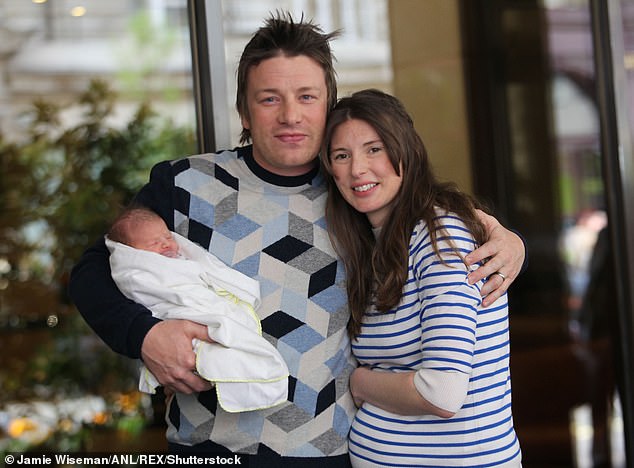Jamie Oliver’s wife Jools reveals she suffered another miscarriage during lockdown… after tragically recalling she lost five babies
- Jools revealed that since giving birth to her son River in 2017, she’s suffered three more miscarriages, one of which was just weeks earlier in lockdown
- Last month, Jools shared a video from her wedding to TV chef Jamie to mark their 20th wedding anniversary
- She penned a touching caption on the post, in which she paid tribute to the five ‘little stars in the sky’ they had lost as well as their own five kids
- Jools and Jamie share Poppy, 18, Daisy, 17, Petal, 11, Buddy, nine, and River, three
- Last year, Jools discussed their tragedies to mark Baby Loss Awareness Week
- In April, Jools revealed she would like to add a sixth child to their brood by the time she turns 47 in November next year
- For support, contact the Miscarriage Association (miscarriageassociation.org.uk) or Sands (sands.org.uk)
Jamie Oliver’s wife Jools has revealed she suffered a miscarriage during lockdown.
The mother-of-five, 46, candidly revealed that since giving birth to her son River in 2017, she has suffered three miscarriages, with one happening just weeks ago.
Jools has spoken openly about the heartbreaking miscarriages she’s suffered during her 20 years of marriage to chef Jamie, and on their wedding anniversary last month paid tribute to the ‘five little stars in the sky’ they had lost.
Sad: Jamie Oliver’s wife Jools has revealed she suffered a miscarriage during lockdown (pictured following the birth of their daughter Petal)
Speaking on the Made By Mammas podcast, host Zoe Hardman noted that Jools had been ‘pining for a sixth child’ before her 47th birthday next year.
Jools then admitted: ‘I really do, I really do but I’ve just had three miscarriages since then and I’m thinking… and a recent one three weeks ago and I’m thinking: ”No,” I dunno. I do want to, but I’ve got to mentally check that it’s a good idea to do.
‘And also physically because I am 45 as I always say, nearly 46. So it’s a little bit dodgy.
‘Jamie is still up for it, kind of… not really. I haven’t got long, maybe another year and then I really will just shut that chapter off because I am very happy and I am pretty full up at the moment as it is.
‘But just that little baby, it’s a terrible thing to keep wanting something and you can’t help it.’
Jools went onto reveal she consulted with a doctor following her most recent miscarriage, adding: ‘I went to see the doctor the other day and he said, ‘How are you mentally?’ and I thought about it and I went: ‘Well, this is the fifth one now,’ I had two before River, and they’ve been early ones, the last two have been at 6 ½ weeks.
‘So I just feel… I’m really good at going ‘Right, I’m pregnant but it won’t work so I’m just going to carry on,’ whilst everyone gets really into it and I have really learnt to not because I’m kind of not very positive about it.’

